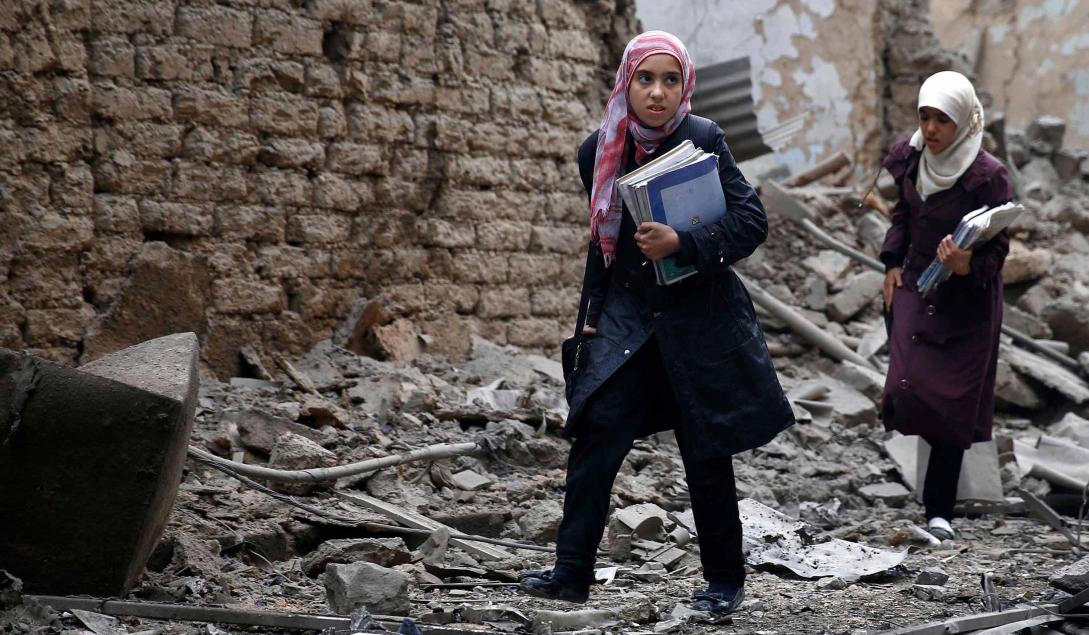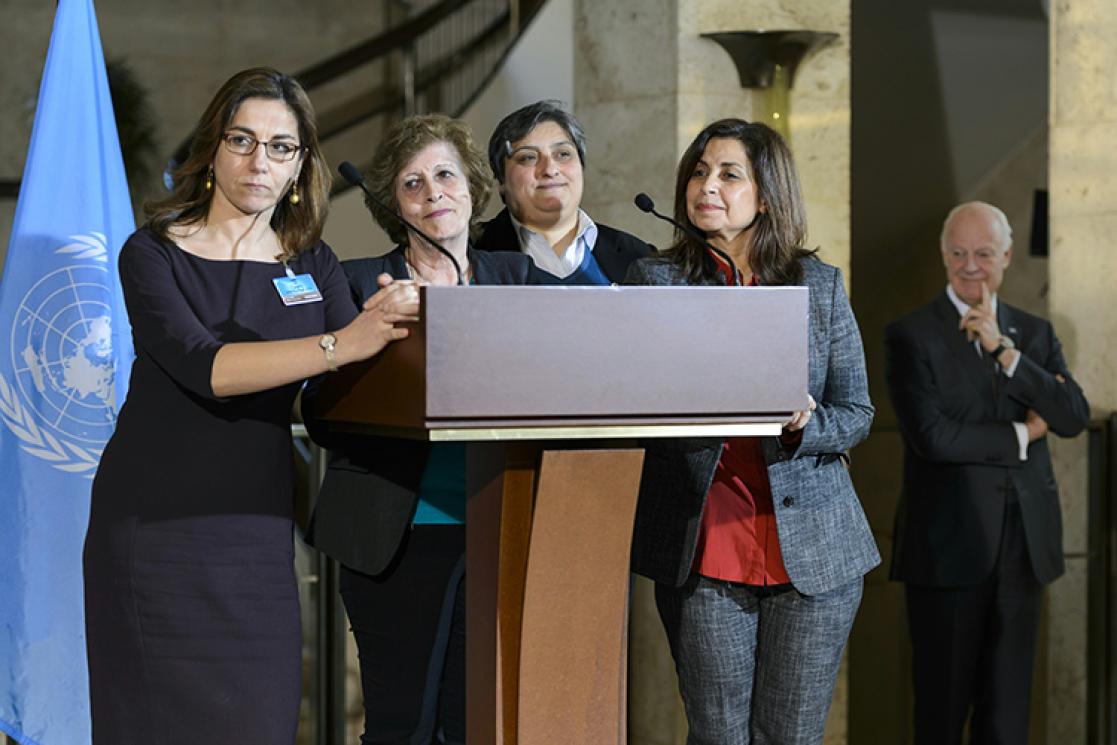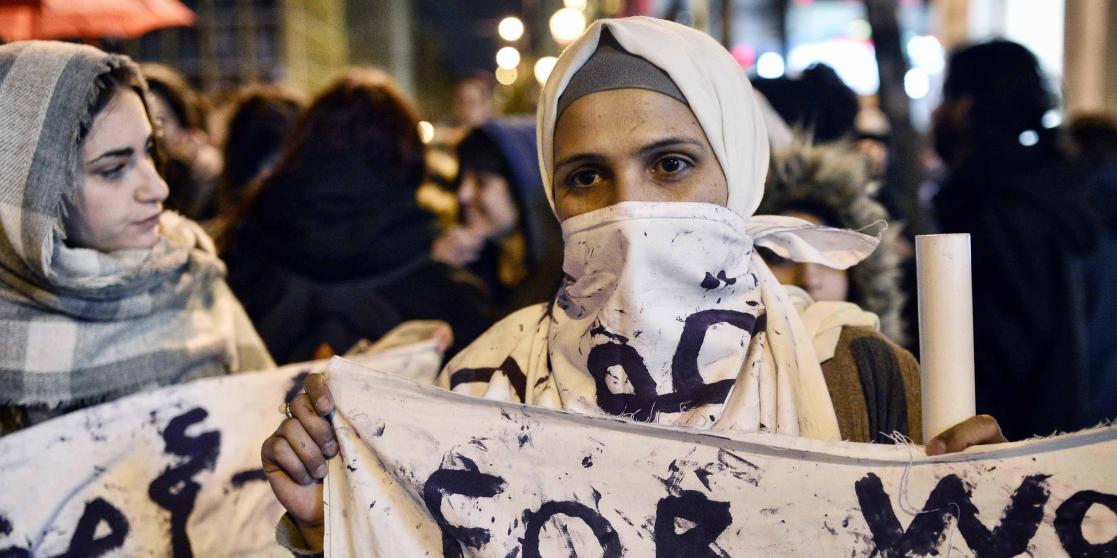Syria: Preparing for peace

"The voice of weapons in Syria is very loud; everybody knows that the Syrian regime has bombed its own people, everybody knows that ISIS has executed many journalists and activists. Yet the voices of Syrian civilians - both women and men - have often been silenced on the world stage," says Rajaa Altalli, Co-Director of the Centre for Civil Society and Democracy, supported by the European Union.
After six years of conflict, violence and destruction, what remains of Syria is a deeply divided and fractured society that will carry its wounds for generations to come. What began as peaceful protests, rapidly spiralled into civil war and the tearing apart, piece by piece, of the social fabric.
Yet history has shown that during times of conflict women have often occupied a greater place in public life and war can be a pivotal moment in gender equality. The vacuum created by the absence of men who are away fighting or killed means women often emerge from their traditional roles. And after six years of conflict, family structures are changing, with more female-headed households than ever.

"The most powerful role a woman can play is being the wife and husband at the same time," says Um- Mohammed, a Syrian refugee who came to Lebanon leaving her husband behind. "That's the most difficult part. I have to be both the mother and father: I take the role of the father by working and providing for the family and that of the mother by cooking and caring for the kids."
With countless atrocities committed during the conflict - torture, sexual and gender-based violence, lack of accountability, and manipulation of religious and ethnic identities – the task of rebuilding trust among communities is massive.
"Al Mafroud - What should be"
Syrian refugees discuss the changing nature of gender roles in Syrian society.
Whatch the full documentary:
https://www.youtube.com/watch?v=UODnpskWkkQ&feature=youtu.be

Women driving peace-building efforts
In Syria, like in many conflicts, women are working as doctors, nurses and teachers. And beyond basic survival-mode, women are also looking towards the future and advocating for a future Syria in which they are represented and preparing for peace.
Speaking this year on International Women’s Day, Federica Mogherini, High Representative of the European Union for Foreign Affairs and Security Policy said, “Women are often among the most vulnerable. However, women are often also the first ones to seek solutions, to look for resilience in times of challenge and those with a vision for the future of their countries," she underlined, "we will not stop fighting for gender equality, to keep women and girls safe, and to empower them to fully realize their potential. The European Union is committed, as it was 60 years ago, to ensuring equality for women around the world."
"Syrian women have been working to make life more bearable in Syria and they are an inspiration for us Syrians who are speechless in front of their courage and patriotism," says Rajaa.
Despite women's active role in promoting peace, they are usually put aside when official peace negotiations begin and rebuilding of the economy starts, left out of official channels. But it is not possible to return to some pre-war traditional social roles and values, which have been deeply shaken by the experience of war. Re-shaping these roles becomes integral in rebuilding war-torn societies.
Hind Kabawat, founder of a women's empowerment programme and member of the High Negotiations Committee, the opposition delegation in the UN-brokered talks in Geneva, was in Brussels attending an EU-funded seminar on the HNC's development of its vision for the transition in Syria. A former lawyer and university professor, she has already seen a huge shift in gender roles.
"Before the revolution women were 'window-dressing'; we had female ambassadors, female ministers, women were involved, but we were 'window dressing' and we didn't really have a say." She continues, "Today, I'm so proud and so impressed that women are not just numbers, they are really doing good work. In each organisation, in each different field, they have impact. Women want to walk to the talk, to do something, and they're building something together; this is the difference I see."
And there is strong evidence that shows that women's participation in peace processes is key to their effectiveness and that women's involvement is more likely to bring about a lasting and durable peace. Women are often very active in civil society and peace movements, for example in Colombia, women were responsible for complex networks of pro-peace movements; in Northern Ireland, Burundi, Liberia there were female coalitions across warring partners.
[[{"fid":"30716","view_mode":"default","fields":{"format":"default","field_caption[und][0][value]":""},"type":"media","attributes":{"class":"media-element file-default"}}]]
UN Resolution 1325: Women, Peace & Security
Affirms the importance of the participation of women and the inclusion of gender perspectives in peace negotiations, humanitarian planning, peacekeeping operations, and post-conflict peacebuilding and governance.
Calls for women’s participation in all elements of peace making, particularly peace negotiations.
Urges the Secretary-General to appoint more women as Special Representatives and Special Envoys, and expand the role of women in field operations, including the placement of gender advisors in UN missions.
Urges the build-up of gender response capability in peacekeeping missions and gender training on the rights and needs of women for all personnel in the maintenance of peace and security.
Emphasizes the need to maintain civilian character of refugee/ IDP camps and the importance of designing camps in a way that helps prevent sexual violence.
Calls for special measures to protect women and girls from sexual and gender based violence.
Asserts the importance of women’s leadership and participation in conflict-resolution, peace talks and recovery.

A seat at the table
Yet fifteen years after the adoption of UN Resolution 1325 on 'Women, Peace & Security', women continue to struggle to get a seat at the negotiation table. Until 2016 the top negotiators for the Syrian opposition and regime were entirely male. That is why the EU is supporting initiatives such as the Women's Advisory Board, a group of Syrian women who are feeding into the UN-led peace talks in Geneva and advising UN Special Envoy on Syria, Staffan de Mistura.
“The Women’s Advisory Board is a different way [for women] to bring forward their own message,” de Mistura explains. “Why? Because in the board, they all talk and all the time, and they intervene on all subjects. They produce papers. They actually produce ideas, suggestions, and questions.”
And High Representative Mogherini has been actively engaging with Syrian women who are seeking to make a difference in public life and to contribute to peace-building in their country, twice inviting a group of delegates of the Women's Advisory Board to Brussels to discuss their views of a way forward for Syria.

Rajaa, herself an active member of the consultations in Geneva says that "the voice of Syrian women and Syrian civil society needs to be amplified and be accounted for when political discussions are taking place in Geneva and elsewhere." Of course high level participation in Geneva is one aspect and it is important to recognise the contributions of grassroots women's networks in Syria and in neighbouring countries hosting Syrian refugees. If an inclusive and pluralistic Syria is ever to emerge from the ashes, all voices need to be heard, not just the educated elite. "With support from the European Union we're preparing women from the grassroots, so that one day they will be involved in political life. They are going to do their best work; today we're preparing the road for them but in the future they are going to take over," says Hind.
Women's Advisory Board
The UN Security Council resolution 2254, the road map for a peace process in Syria, refers to an inclusive and Syrian-led political process and it "encourages the meaningful participation of women in the UN facilitated political process for Syria".
And UN Special Envoy for Syria, Staffan de Misura therefore developed a mechanism to facilitate the participation of Syrian women and civil society in the intra-Syrian talks.
The Women’s Advisory Board (WAB) is a group of of twelve independent civil society representatives who raise matters missing from the agenda, develop policy positions, make recommendations to assist the peace talks, and propose gender-responsive perspectives.
While civil society and women organisations are not formally negotiating parties at this stage of the political process, including women's interest groups is critical to build credibility and legitimacy of any transition.
The European Union financially contributes to the functioning of these groups, as well as organising events for the groups to provide advice on policy issues on Syria.
Video Interview with Hind Kabawat
member of the High Negotiations Committee
Tastakel Women and Girls Centre
Funded by the European Union, the Tastakel Women and Girls Centre is a collective established in 2015 by the Women's Centre NGO in Gazientep.
It is dedicated to empowering adolescent girls and women refugees from Syria through literacy education, vocational training and community support. Programmes run by Tastakel centre around women's political empowerment and interfaith peacebuilding.

Written into the future
And when a peaceful solution to the conflict is finally reached and the long process of re-drawing a legislative process and a new constitution for Syria, women like Daad, with support from the EU, are working to ensure that women are indeed written into the constitution: "We are discussing and promoting a Syrian Constitution that would respect and include women’s rights. We have drafted gender sensitive constitutional principles and are now promoting them. We work on capacity-building for lawyers and awareness-raising on a broader level to create a culture of democracy and equality."
A lawyer and activist, Nerevan explains that “when the time comes for writing the new constitution of Syria, we will have the knowledge and tools to push for the inclusion of women’s rights. This program is a game-changer because it gathers Syrian lawyers and drives them to work in a systemic way on gender in the constitution and legislation.”
Experience has shown that gender equality on paper is one thing, but for it to take hold it needs to address a broad and diverse section of society and that stereotypes and attitudes are the hardest to shift.
"If we don't use quotas, women will not get anywhere. That's why we fought hard and got the HNC's approval, which was then endorsed by the UN, that in a future Syria we will enforce a 30% quota for female participation in public life," says Hind. "Men's attitudes are difficult to change and we're sick and tired of trying to change them so that's why we have to push for quotas: women will be there whether they want it or not."
EU Strategy for Syria
The Elements for an EU Strategy for Syria endorsed by the Foreign Affairs Council of April 2017 sets out the EU's engagement on Syria. As part of the strategy, one of the key objectives of the EU is the need to "promote democracy, human rights and freedom of speech by strengthening Syrian civil society organisations".
The strategy states that "the EU will continue to provide substantive support to Syrian civil society organisations, which share the values of promotion of democracy, human rights and freedom of speech." Looking ahead to post-conflict Syria, Syrian civil society will play a prominent role in a post-conflict Syria, "including helping the country to deal with the past, enabling efforts for local and national reconciliation, intercultural and interreligious dialogue, and contributing to the monitoring of any political agreement."
That is why the EU is working on strengthening civil society to give voice to the widest possible spectrum of Syrian society, as well as supporting "women’s, youth and minority rights organisations that promote an agenda for their participation in an inclusive and democratic Syria. Support for freedom of speech should include support to development of dynamic, free and independent media and the fostering of channels for open and tolerant communication including through social media."
Photo credits
Agency Française Presse, EU/ECHO, EC - Audiovisual Service, Euromed Feminist Initiative
